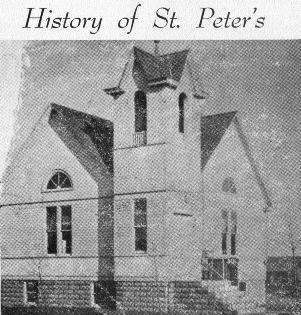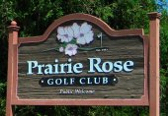
The Old Church
The town of Brunsville, about 6 miles west of Le Mars, north of High- way No. 3, was founded around the year 1910. The first settlers were mostly people of the Lutheran faith. It was natural of them to have Lutheran services in this newly founded town. Therefore they applied to Rev. Schmidt of Ireton, a Lutheran Pastor of the Missouri Synod, to conduct services here. Gladly Rev. Schmidt accepted and for a while held services here.
At this time a meeting was called of all Lutherans in and around Brunsville for the purpose of organizing a Lutheran Congregation. Many responded and the meeting was held. George Popken of Brunsville was elected Chairman, and J. W. Hauschild, Secretary. The new congregation was organized with 13 charter members. It was named St. Peter's Evangelical Lutheran Church of Brunsville. The following officers were elected: George Popken, H. Marienau, H. G. Johnson, Deacons; J. W. Hauschild, Secretary.
The newly founded congregation had no house of worship. A meeting was called to consider buying the Methodist Church of Dalton, which was offered for sale. All members were in favor of buying the church to be moved to Brunsville. A building committee was elected to inquire about this matter. The members of the committee were: Edw. Johnson, Carl Olt-manns and G. F. Null. A committee on constitution was also elected. The members were: J. W. Hauschild, John Dirks, and G. W. Heren.
The Methodist Church of Dalton was bought in the summer of 1917. Moved to Brunsville, it was remodeled and re-dedicated on Sept. 2, 1917. The congregation had now a house of worship where the people could assemble every Sunday, hear the Word of God, sing and pray. In order to have services regularly and school for the children, the congregation decided to call a student to serve as Vicar of Rev. Schmidt. Student Louis Theimer was called and he served the congregation several months. Because the congregation increased in membership it was thought to call a resident pastor. On January 14, 1918, a special meeting was held at the church. Rev. Witt, President of the Western District of the Wisconsin Synod, presided at this meeting. It was decided, on suggestion of Rev. Witt, to extend a Call to Rev. O. Klett, a pastor of the Wisconsin Synod. The Call was accepted and the Pastor moved to Brunsville in the spring of 1918. He served the congregation until 1919, when he received and accepted another Call. After Rev. Klett left, the congregation was served by Student Carl Stasen, until April, 1920. May 20, 1920, the congregation extended a Call to Rev. Walter Zank, a pastor of the Wisconsin Synod, who served a congregation in Wisconsin. The Call was accepted and the family moved to Brunsville in the summer of 1920. Because the congregation had no parsonage, it was decided to rent rooms for the pastor and family until a parsonage could be built. The Congregation decided in a special meeting on Feb. 24, 1922, to build a parsonage. Rev. W. Zank, John Dirks, and Henry Dirks were elected on the building committee. The parsonage was built in the summer of 1922 and occupied by the Pastor and his family in the fall. The cost of the parsonage was $2,945.00. During the pastorate of Rev. Zank the membership increased considerably.
For the instruction in God's Word and Catechism, a Parochial School was established by the Pastor. This school was maintained from the time of its founding in 1922 until 1927. The Young People's Society, which was founded by Student L. Theimer, grew in membership. The Ladies Aid, which had thus far been a non-sectarian society, was reorganized and named: St. Peter's Lutheran Aid. It increased in membership greatly and was of great help to the Congregation financially and socially. In one of the meetings it was decided to accept the offer of Ihnke C. Harms, to donate one acre of ground west of town, for a cemetery. The ground was leveled off, fenced in and laid out in family lots and single grave lots. The price for a family lot was set at $20.00, and for a single grave lot, $5.00. Faithfully the Pastor labored in the congregation for over six years. In September, 1926, he received a call to a congregation in Wisconsin and asked for an honorable discharge. Sept. 17, 1926, in a specially called meeting, the matter was discussed and finally, though with deep regret, decided to grant Rev. Zank an honorable and peaceful release.
